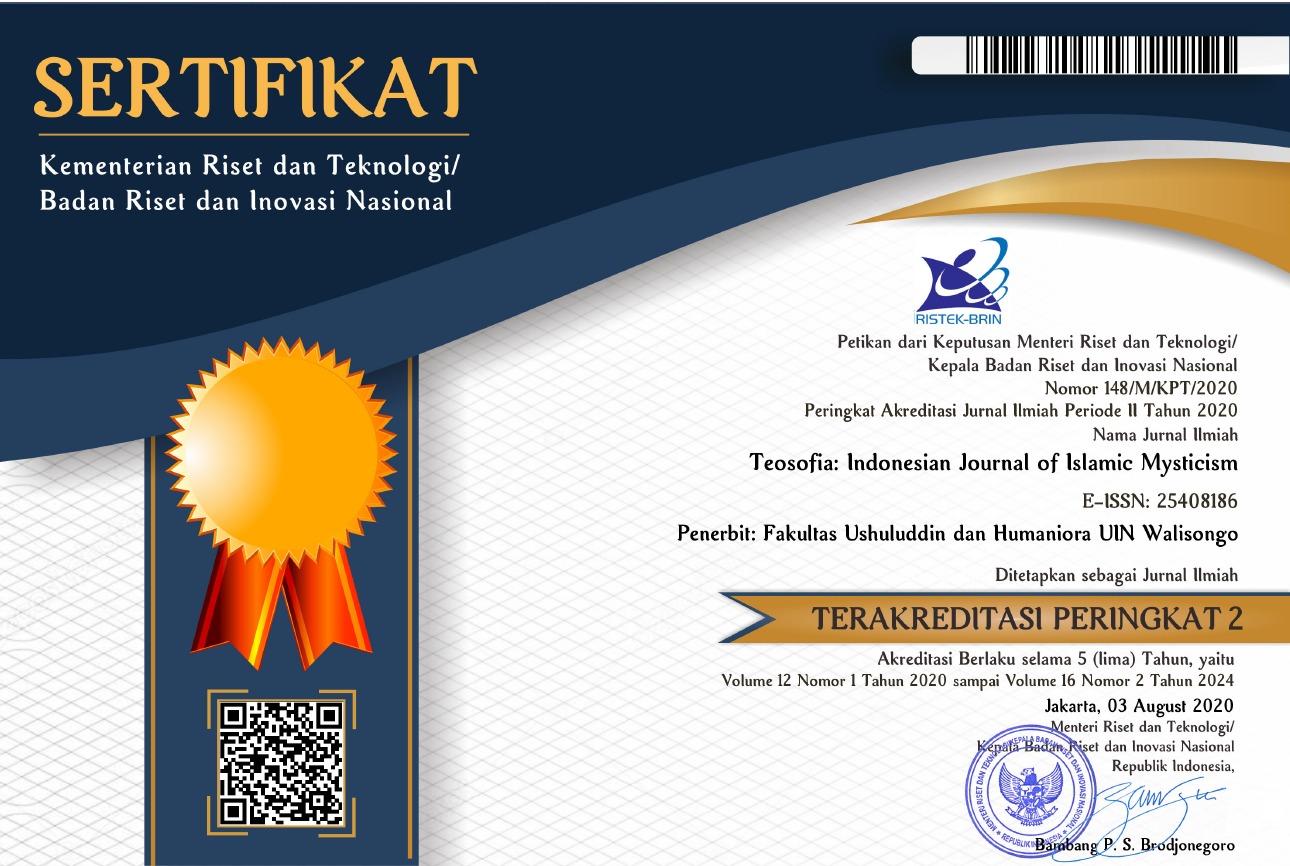Al-Ghazali's Eco-Sufism for Environmental Preservation: Living Sufism at Pesantren Al-Anwar 3 of Central Java
DOI:
https://doi.org/10.21580/tos.v13i1.22139Keywords:
Pesantren Al-Anwar 3, Al-Ghazali, ecology, ecosufism, environmental preservationAbstract
Natural destruction is a severe problem faced by human beings up to the present. Many factors are identified, including less awareness of its preservation, no matter how much research is exposed. This study investigates how Al-Ghazali’s ecosufism theory is implemented at Pesantren Al-Anwar 3 of Central Java. This study employs a qualitative method with field research, which involves an anthropological approach to observe and analyze the implementation of al-Ghazali’s ecosufism concept regarding environmental ethics and waste management at Pesantren Al-Anwar 3 in Central Java. The research findings reveal al-Ghazali’s concept in dealing with environmental issues, including shukr (thankfulness), zuhd (asceticism), ‘uzla (seclusion) and maḥabba (love). They are practiced by Pesantren Al-Anwar 3 by creating innovative waste management systems, such as burning without emitting smoke, optimizing organic waste as worm feed, and utilizing the remaining combustion as material for paving. This shows how Al-Ghazali’s ecosufism theory is implemented in waste management and can effectively reduce the impact of natural damage.
Contribution: This research contributes to overcoming natural damage by applying al-Ghazali’s ecosufism theory and combining it with ecological principles. It can be one of the effective ways to offer a sustainable ecological management model that can be widely adopted to overcome environmental problems that modern humans face today.
Downloads
References
Abidin, Ahmad Zainal, and Fahmi Muhammad. “Tafsir Ekologis Dan Problematika Lingkungan (Studi Komparatif Penafsiran Mujiyono Abdillah Dan Mudhofir Abdullah Terhadap Ayat-Ayat Tentang Lingkungan).” QOF 4, no. 1 (June 15, 2020): 1–18. https://doi.org/10.30762/qof.v4i1.1990.
Al-A’sam, Abd Amir. Al-Failusuf Al-Ghazali. Beirut: Dār Qaba’, 1998.
Al-Ghazali, Muhammad. Al-Hikmah Fi Maklūqātillah. Beirut: Dār Ihyā al-Ulūm, 1978.
———. Al-Tibru Al-Masbūk Fī Nasīhatil Mulk. Beirut: Dār Al-Kutub Al-Ilmiyah, 1978.
———. Ihyā ’Ulūmuddīn. Vol. 3. Beirut: Dār Al-Fikr, 1991.
———. Mi’rāj Al-Sālikīn Fi Majmu’at Al-Rasāil Imam Al-Ghazali. Beirut: Dar Ihya’ Al-’Ulūm, 1991.
Al-Maraghi, Ahmad Mushthafa. Tafsir Al-Maraghi. Vol. 2. Mesir: Mustafa Al-Babi Al-Halabi, 1974.
Al-Sijistani, Abu Daud. Sunan Abi Daud. Beirut: Mu`assasah al-Rayyan, 1998.
Anggraini, Reni Dian, and Ratu Vina Rohmatika. “Konsep Ekosufisme: Harmoni Tuhan, Alam Dan Manusia Dalam Pandangan Seyyed Hossein Nasr.” Al-Adyan: Jurnal Studi Lintas Agama 16, no. 2 (February 9, 2022): 1–30. https://doi.org/10.24042/ajsla.v16i2.9971.
Aprilia, Wenny Kania, Saeful Anwar, and Dedi Herdiana. “Peran Santri Dalam Pelestarian Lingkungan.” Tamkin: Jurnal Pengembangan Masyarakat Islam 6, no. 2 (June 10, 2021): 149–66. https://doi.org/10.15575/tamkin.v6i2.24049.
Arroisi, Jarman, Diana Aristika Putri, and Muhammad Fahmi Amrullah. “Building Personality from Al-Ghazalī’s Perspective: Critical Study of Freud’s Psychoanalytic Theory.” Teosofia: Indonesian Journal of Islamic Mysticism 11, no. 2 (December 19, 2022): 143–62. https://doi.org/10.21580/tos.v11i2.13401.
Aziz, Abd. “Konservasi Alam Dalam Perspektif Etika Islam: Tantangan Dan Tuntutan Globalisasi.” Akademika : Jurnal Pemikiran Islam 19, no. 2 (2014): 304–21. https://e-journal.ejournal.metrouniv.ac.id/akademika/article/view/417.
Aziz, Ahmad Amir. “Living Sufism: Paradigma, Eksistensi, Dan Kontekstualisasi.” In Horizon Ilmu: Reorientasi Paradigmatik Integrasi Keilmuan, edited by Fahrurrozi. Mataram: UIN Mataram Press, 2022.
Fitriani, Vina, and Mukhlis Aliyudin. “Dakwah Dalam Pendekatan Konsep Ekologi.” Tabligh: Jurnal Komunikasi Dan Penyiaran Islam 6, no. 1 (April 26, 2021): 80–99. https://doi.org/10.15575/tabligh.v6i1.2154.
Foltz, Richard. Islam and Ecology: A Bestowed Trust. Cambridge: Harvard University Press, 2003.
Gufron, Uup, and Radea Yuli A. Hambali. “Manusia, Alam Dan Tuhan Dalam Ekosufisme Al-Ghazali.” Jaqfi: Jurnal Aqidah Dan Filsafat Islam 7, no. 1 (June 29, 2022): 86–103. https://doi.org/10.15575/jaqfi.v7i1.16275.
Gule, Yosefo, and Eduwaret Pratam Surbakti. “Eco-Teosentris: Studi Eco-Teologi Dan Kearifan Lokal Dalam Masyarakat Batak Toba.” Jurnal Teologi Berita Hidup 4, no. 1 (September 21, 2021): 100–116. https://doi.org/10.38189/jtbh.v4i1.182.
Irawan, Bambang. “Islamic Boarding Schools (Pesantren), Sufism and Environmental Conservation Practices in Indonesia.” HTS Teologiese Studies / Theological Studies 78, no. 4 (March 29, 2022): 1–10. https://doi.org/10.4102/hts.v78i4.7073.
Katsir, Ibn. Tafsir Qur’an Al-’Adzīm. Vol. 3. Mesir: Dār al-Ma’rifah, 1978.
Kuen, Fyan Andinasari, Hafied Cangara, and Hasrullah Hasrullah. “Peradaban Dan Politik Global Samuel P. Hungtington.” Al-MUNZIR 15, no. 2 (January 11, 2023): 237–54. https://doi.org/10.31332/am.v15i2.3424.
Makhrus, Restu, Frida Utami. “Peran Filantropi Islam Dalam Pemberdayaan Masyarakat Di Kabupaten Banyumas.” Seminar Nasional Hasil-Hasil Penelitian Dan Pengabdian LPPM Universitas Muhammadiyah Purwokerto, no. November (2015).
Mangunjaya, Fachruddin Majeri, and Gugah Praharawati. “Fatwas on Boosting Environmental Conservation in Indonesia.” Religions 10, no. 10 (October 12, 2019): 570. https://doi.org/10.3390/rel10100570.
Mustolikh, Mustolikh, Dasim Budimansyah, Darsiharjo Darsiharjo, and Encep Syarief Nurdin. “Bencana Alam Dan Etika Lingkungan Hidup Dalam Al-Qur’an.” Proceedings Series on Social Sciences & Humanities 6 (July 28, 2022): 170–76. https://doi.org/10.30595/pssh.v6i.459.
N.S, Suwito. “Eko-Sufisme Studi Tentang Usaha Pelestarian Lingkungan Pada Jama’ah Mujahadah Ilmu Giri Dan Jama’ah Aoliya’ Jogjakarta.” Universitas Islam Negeri Syarif Hidayatullah Jakarta, 2010.
Rambe, Toguan, Seva Maya Sari, and Nurhayani Rambe. “Islam Dan Lingkunagn Hidup: Menekar Relasi Keduanya.” Abrahamic Religions: Jurnal Studi Agama-Agama 1, no. 1 (2021): 1–14. https://doi.org/10.22373/ARJ.
Rozi, Syafwan. “Uderstanding the Concept of Ecosufism: Harmony and the Relationship of God, Nature and Humans in Mystical Philosophy of Ibn Arabi.” Ulumuna 23, no. 2 (December 30, 2019): 242–65. https://doi.org/10.20414/ujis.v23i1.354.
Sarah, Siti, and Radea Yuli A. Hambali. “Ekofilosofi ‘Deep Ecology’ Pandangan Ekosentrisme Terhadap Etika Deep Ecology.” In CISS 4th: Islamic Studies Across Different Perspective: Trends, Challenges and Innovatio, 754–61. Bandung: Gunung Djati Conference Series, 2023.
Suhaimi. “Eko-Sufisme Di Pesantren Studi Atas Konservasi Lingkungan Di Pondok Pesantren Putri 1 Al-Amien Prenduan.” IAIN Madura, 2021. http://etheses.iainmadura.ac.id/1103/.
Sururi, Ahmad, Arqom Kuswanjono, and Agus Himmawan Utomo. “Ecological Sufism Concepts in the Thought of Seyyed Hossein Nasr.” Research, Society and Development 9, no. 10 (October 9, 2020): e5769108611. https://doi.org/10.33448/rsd-v9i10.8611.
Syahida, Ahmad Ridla. Ekosufisme Di Dalam Tafsir Indonesia Kontemporer. Purbalingga: Eureka Media Aksara, 2023.
Tucker, Mary Evelyn, and John A. Grim. “Introduction: The Emerging Alliance of World Religions and Ecology.” Daedalus 130, no. 4 (2001): 1–22. https://www.amacad.org/publication/daedalus/introduction-emerging-alliance-world-religions-and-ecology.
Watt, W. Montgomery. The Faith and Practice of Al-Ghazālī. London: Allen and Unwin Ltd, 1953.
WWF-Indonesia. “Mulung Ciliwung: Aksi Nyata Untuk Kurangi Sampah Sungai Ciliwung Dan Jaga Sumber Air Bersama.” https://www.wwf.id/, 2020. https://www.wwf.id/id/blog/mulung-ciliwung-aksi-nyata-untuk-kurangi-sampah-sungai-siliwangi#:~:text=Berlokasi di salah satu segmen Sungai Ciliwung%2C tepatnya,dan menjaga sungai sebagai sumber air bagi masyarakat.
Downloads
Published
How to Cite
Issue
Section
License
Copyright
The copyright of the received article shall be assigned to the journal as the publisher of the journal. The intended copyright includes the right to publish the article in various forms (including reprints). The journal maintains the publishing rights to the published articles. Therefore, the author must submit a statement of the Copyright Transfer Agreement.*)
Licensing

This work is licensed under a Creative Commons Attribution-ShareAlike 4.0 International License.
In line with the license, authors are allowed to share and adapt the material. In addition, the material must be given appropriate credit, provided with a link to the license, and indicated if changes were made. If authors remix, transform or build upon the material, authors must distribute their contributions under the same license as the original.
_______
*) Authors whose articles are accepted for publication will receive confirmation via email and send a Copyright Transfer Agreement.








